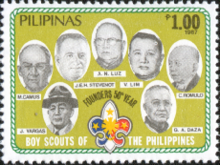Carlos P. Romulo
Carlos Peña Romulo Sr. GCS CLH NA GCrM GCrGH KGCR (January 14, 1899 – December 15, 1985) was a Filipino diplomat, statesman, soldier, journalist and author.
[1] His father transitioned to working for the US government in the Philippines after the war, rising through the ranks as town councilor, mayor, and eventually the governor of Tarlac province.
[4][5] He was one of the last men evacuated from the Philippines before the surrender of US Forces to the invading Japanese, as illness had prevented him from departing with MacArthur, finally leaving from Del Monte Airfield on Mindanao on April 25.
[6] Active in propaganda efforts, particularly through the lecture circuit, after reaching the United States, he became a member of President Quezon's War Cabinet, being appointed Secretary of Information in 1943.
This was the title of the non-voting delegate to the U.S. House of Representatives for lands taken in the Spanish–American War, and as such, he is the only member of the U.S. Congress to end his tenure via a legal secession from the union.
In 1948, at the third UN General Assembly in Paris, France, he strongly disagreed with a proposal made by the Soviet delegation headed by Andrei Vishinsky, who challenged his credentials by insulting him with this quote: "You are just a little man from a little country."
In return, Romulo replied, "It is the duty of the little Davids of this world to fling the pebbles of truth in the eyes of the blustering Goliaths and force them to behave!
In the days preceding the UN General Assembly vote on the Partition Plan for Palestine in 1947, Romulo stated "We hold that the issue is primarily moral.
The issue is whether the United Nations should accept responsibility for the enforcement of a policy which is clearly repugnant to the valid nationalist aspirations of the people of Palestine.
The Pulitzer Prize website states that Carlos P. Romulo was awarded "for his observations and forecasts of Far Eastern developments during a tour of the trouble centers from Hong Kong to Batavia".
He fell two votes short of the required seven-vote majority in the Security Council, finishing second to Lester B. Pearson of Canada.
From January 1952 to May 1953, Romulo became the second former member of the Congress to become the ambassador to the United States from a foreign country, following Joaquín M. Elizalde, who had been his immediate predecessor in both posts.
Romulo warned against the threats of communism in Asia and justified that SEATO as a purely defensive and non-aggressive security pact.
Participating countries viewed that colonialism, racialism, cultural suppression, discrimination, and nuclear weapons were considered regional threats.
"It is the duty of the little Davids of this world," cried Romulo, "to fling the pebbles of truth in the eyes of the blustering Goliaths and force them to behave!"




